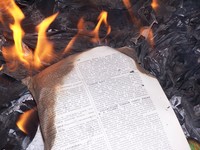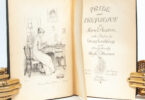
It doesn't take a seasoned Bibliophile to know that fire will charbroil your book collection in a hurry.
Does any author on the subject have an edge on one of our favorites when it comes to books’ worst fates? In The Enemies of Books (first published in 1880; we recommend the second edition for its many corrections and additions), William Blades discourses on hazards as varied as bigotry and neglect, bookbinders and the bookworm, and, of course, fire and water.
We thought of Blades when a bookseller told us her story, which we are welcome to share without mentioning her name, she said; for extra anonymity, we also agreed to alter her dog’s breed. –
The dealer works out of her home and specializes in old books, all of which she protects with clear plastic covers. One day she smelled smoke and found it filling a room full of books. She saw some of her newest acquisitions burning. She also saw her newly acquired Scottish terrier puppy cowering in a corner. Yelling for her husband to call the fire department, she saw the cause: a sparking electrical outlet and, beneath it, an impressive puddle. The puppy’s accident had caused another, one with the potential for catastrophe, as sparks showered on one book after another. The dealer grabbed a fire extinguisher and rescued the dog. Firemen arrived quickly and the blaze was contained.
Later, a fireman told the dealer how lucky she was. The plastic covers on her books retarded burning. By no means are they fireproof, but the covers melt and flame at temperatures higher than the Fahrenheit 451 Ray Bradbury long ago seared into readers’ brains as the point at which paper burns.
Plastic covers were scorched, but they were easier to replace than the books they shielded. The dealer used heavy archival plastic bags to store many books, which were spared the acrid smell that left some of her unprotected stock reeking.
The lessons are obvious and imperative.
Install smoke alarms, and test them regularly. Keep fire extinguishers within easy reach. Remember, though, that keeping one handy isn’t enough; be sure that you know how to use it — fire won’t wait for you to read the instructions. And for pups entering the book business, proper housetraining is recommended!
Water damage is dramatic when caused by nature, but just as harmful when the source is a building’s plumbing and a careless upstairs neighbor.
Another dealer, who stores some of his most precious stock in a closet in a high-rise, told us of his worst moment. There had once been a leak in his building, and with that in mind, he shelved his plastic-jacketed books in archival-quality bags, four or five to a sack. When one day he found water cascading from the closet’s ceiling, he lost not a single volume. The multiple layers of plastic kept the books dry, and bagging several books together speeded their rescue.
Among the lessons here: don’t wait for a leak; look for evidence periodically. Keeping books in plastic sacks may be unappealing or impractical. Books so stored need periodic airing; another chore perhaps, but worth the effort if your space has a history of leaks. We’re adamant that books need plastic bags of their own: 2-mil clear plastic, available in a range of sizes, provide resistance to water and visibility. When it comes to storing books, curb the laudable urge to recycle: even if it looks clean and dry and whole, a bag that has been anywhere near food or beverages is taboo.
We also wouldn’t be without our stash of plastic sheeting, cut in lengths and widths somewhat larger than our shelves, to spread over shelved books as a first response prior to removing books to safety. Assuming you have more shelves to clear than people to help when rescue is necessary, plastic sheeting cannily arranged can give you time to get the job done.
Think of plastic covers, for books with or without jackets, and plastic storage bags as a form of insurance. They’ll protect your peace of mind as well as your books.
Bern and Margot are authors of The Care and Feeding of Books Old and New: A Simple Repair Manual for Book Lovers (St. Martin’s Press) and owners of Dog Lovers Bookshop.







[…] one of their drawbacks becomes apparent in a fire. While they protect against smoke damage and “melt and flame at temperatures higher than the Fahrenheit 451 Ray Bradbury long ago seared into read…,” the covers can still melt into your […]